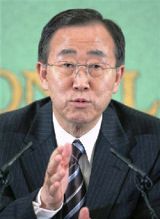UN chief vows “no stone unturned” in Darfur
September 25, 2007 (UNITED NATIONS) — U.N. Secretary-General Ban Ki-moon warned world leaders on Tuesday of daunting challenges in the year ahead and vowed to leave “no stone unturned” to resolve the crisis in Darfur.
 “They are problems that respect no borders — that no country, big or small, rich or poor, can resolve on its own,” Ban told the opening of the annual ministerial General Assembly session.
“They are problems that respect no borders — that no country, big or small, rich or poor, can resolve on its own,” Ban told the opening of the annual ministerial General Assembly session.
“I expect the year ahead to be among the most challenging in our history,” Ban said after a weekend of meetings on Sudan, Iraq, Afghanistan, the Middle East and global warming.
“Looking to the coming year, and beyond, we can foresee a daunting array of challenges to come,” he said.
Speaking shortly before U.S. President George W. Bush, who announced new U.N. sanctions against Myanmar’s military rulers, Ban departed from his prepared text to say he was closely watching developments in the southeast Asian country.
“We again urge the authorities in Myanmar to exercise utmost restraint, to engage without delay in dialogue with all the relevant parties to the national reconciliation process on the issues of concern to the people of Myanmar,” Ban said after private talks with Bush.
Ban said he would shortly send Undersecretary-General Ibrahim Gambari to Myanmar, formerly Burma, where the government poured troops and police into the capital Yangon on Tuesday in an attempt to end the biggest demonstrations against military rule in nearly 20 years.
The secretary-general also promised to reform the U.N. bureaucracy.
“We need to pay less attention to rhetoric, and more attention to results — to getting things done,” Ban said.
On Sudan, Ban said he would “leave no stone unturned to end the tragedy in Darfur.”
The United Nations is attempting to deploy up to 26,000 troops and police to protect civilians in Sudan’s western region, where tens of thousands of people have died and more than 2.5 million have been expelled from their homes.
The U.N. and Khartoum, backed by the African Union, have different views on the composition of the force, with Sudan insisting on an all-African infantry. Ban has also initiated peace talks and is pressing Khartoum to observe a cease-fire.
“The government of Sudan must live up to its pledge to join comprehensive peace talks and implement a cease-fire,” he said.
“Any enduring solution must address all of them — security, politics, resources, water, humanitarian and development issues,” Ban said.
Turning to the Israeli-Palestinian conflict, Ban said that peace was “vital to the stability of the region and the world.”
“We know what is required: an end to violence, an end to occupation, the creation of a Palestinian state at peace with itself and Israel, and a comprehensive regional peace between Israel and the Arab world,” he said.
Iraq, Ban said, had become the “whole world’s problem.” He said the United Nations had an increased role to play in promoting political reconciliation, the topic of a weekend meeting.
But Ban, who has proposed increasing the number of U.N. officials in Baghdad and elsewhere, said he recognized that the “safety and security of U.N. staff is paramount.”
(Reuters)
